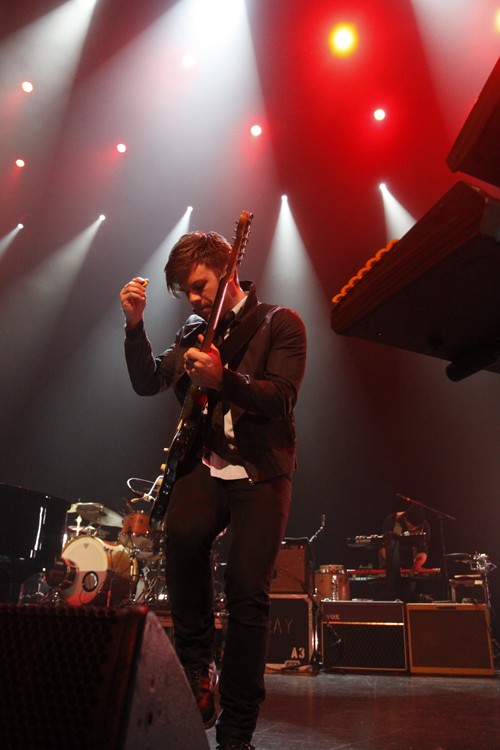Maybe they’re finally listening, Wildcats: This is what we want.
The usually geriatric UApresents and the usually grossly out of touch ASUA finally hit the right note with the electric, acoustic show from Denver-based soft rockers The Fray, who played to an enthusiastic sold-out crowd in Centennial Hall last night.
It was a night that blended black denim, crooning vocals, lights, and not-too-sweet singing along into a frothy mix of just enough scuff and just enough swagger to make this year’s concert attempt much more on pitch with what UA students want than last spring’s Jay-Z debacle. Even if all you know about The Fray comes from their convenient pairing with “”Grey’s Anatomy,”” the enthusiasm and genuine-feeling congeniality with the band will leave you downloading more. They played music pretty well, too.
The group of six played all the more famous songs of their double-platinum first album, but branched into lesser-known and even did a very well-received cover of Kanye West’s “”Heartless.”” Though the show started late and it took the band and the crowd a while to warm up, the entire band was impressively ambidextrous and animated.
Though hits “”How To Save A Life”” and “”Never Say Never”” garnered the most screaming, the band played everything with impressive enthusiasm. Unlike other rockers, these professional performers looked like real, healthy young dudes having a great time living the dream. The drummer in particular, clad in scuffed Vans slip-ons and a dapper fedora, was magnetic to watch as he rocked out in every sense on nearly every song. The other percussionist, tucked back on stage left, was also great, consistently killing it on tambourine and bongos.
They seemed admirably sober and front man Isaac Slade even apologized for the show’s half-hour delay. “”I was just sitting around absorbing your beautiful campus,”” he explained before dedicating the hit “”How to Save A Life”” to the audience. “”In every way, this one’s for you.””
Slade also expressed gratitude for the band’s show at the UA in 2007, when he says they were “”still pretty obscure.”” He went on to say, “”You were one of the early ones. That means a lot to us.””
Slade is a talented musician, playing both piano and acoustic guitar as well as lending his deep, just-gravelly-enough vocals to nearly every song. He’s also a fair showman, connecting with the audience about Tucson, the drummer’s Spanish talents (“”Hola, Tucson,”” he said, when prompted by Slade), and just how loudly Tucson could sing along.
Highlights of the night included both the shredding electric guitar by emo-handsome Tucson native (as reported onstage by a smiling Slade) Dave Welsh and the occasional vocals of flannel-wearing Joe King, who once played electric guitar and piano on the same song. Slade treated the audience to much humor, climbing on the equipment boxes and encouraging the crowd to sing along.
The high point of the energetic show may have come when Slade asked the audience to hush and proceeded to sing an entire verse to the full audience completely a cappella with no electronic projection at all. It took a minute to get the crowd quiet, and there were a few disrespectful shouts, but the inimitable performance and the roar of enthusiasm when the band joined him again are not easily forgotten.
The comparisons of this concert to last year’s failed Last Smash Platinum Bash are inevitable. The relative success of this one are best personified in an image, spotted toward the end of The Fray’s return to the stage: new ASUA president Chris Nagata dancing on the arms of his chair and singing along with Slade and the mostly-female audience that filled Centennial Hall.
I can’t presume to speak for too many people, but at least the 2,000 people present last night can agree: friendly, relatable, real-feeling bands like The Fray are what the UA is interested in seeing, on a Centennial Hall scale. We are not about rappers with crazy demands and tickets that cost more than our meal plan. It may sound weird and it may not be for everyone, but we’re about talented, sober guys who dance on pianos. The UA has, for once, an audible collective voice.








